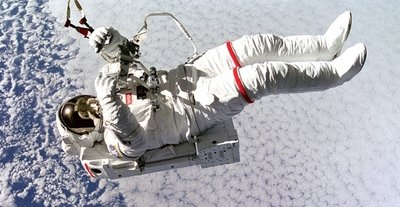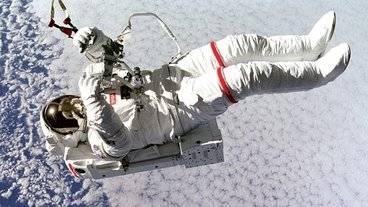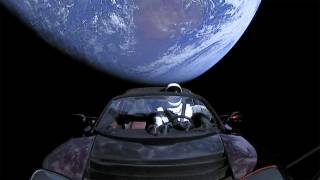Space Travel: The Path to Human Immortality?
Source: alternet.org
Space exploration might just be the key to human beings surviving mass genocide, ecocide or omnicide.On December 31st, 1999, National Public Radio interviewed the futurist and science fiction genius Arthur C. Clarke. Since the author had forecast so many of the 20th Century's most fundamental developments, the NPR correspondent asked Clarke if anything had happened in the preceding 100 years that he never could have anticipated. "Yes, absolutely," Clarke replied, without a moment's hesitation. "The one thing I never would have expected is that, after centuries of wonder and imagination and aspiration, we would have gone to the moon ... and then stopped."
Were Clarke alive today, he undoubtedly would have added, "and then lost so much interest that we erased the tapes of our epochal voyage because of a shortage of blank cassettes."
This month, the 40th anniversary of Buzz Aldrin and Neil Armstrong's first footsteps on the moon, you will hear many rationales for sending humans into space, many noble goals that the challenge of space can help humanity to fulfill. However, in cosmological consequence, one, and only one, stands paramount above all others -- human immortality. Space is the only place where we can ensure ourselves against extinction.

Jonathan Schell, our great chronicler of the dilemmas of the nuclear age, has written often about the ascending gradations of extermination that human beings might commit. Genocide is an act aimed at annihilating all members of a particular human group - defined by ethnicity or religion or some other perceived collective hatred - Hitler's attempt to obliterate the Jews the most famous but hardly the only historical example. Specicide would be an act eliminating the whole of the human race. Ecocide, or perhaps biocide, or perhaps omnicide, would be an act exterminating not just all humans, but the entire circle of life on planet earth itself.
An asteroid impact, or certain kinds of disruptions of our sun, or perhaps other cosmological cataclysms could probably pull all those off without even breaking a sweat. And our sun in any case has an expiration date, some 4 or 5 billion years down the road. A quarter century before the voyages of Apollo, the invention of the nuclear weapon gave life on Earth, for the first time, the capacity to bring about its own extinction by its own hands. It will not be long before biotech and nanotech and god-knows-what-other techs obtain the same capacity. And it is far from impossible to suppose that human-induced climate change may unfold so badly in the decades to come that it too could threaten to bring about the same result.
This period, where we hold this capability to destroy ourselves but before we have found a way to save ourselves, might be called the human race's ultimate "window of vulnerability." But we also now possess a "window of opportunity," to endeavor, in, oh, the next five or ten centuries or so, to establish the human race permanently beyond the cradle of its birth -- first perhaps on our moon, then perhaps on Mars and in the asteroid belt and on some of the moons of Jupiter and Saturn, and then beyond the bounds of our solar system itself. We have it within our grasp to venture slowly but inexorably outward, in tiny lifeboats afloat on an infinite sea, to explore and then to colonize and then to live our lives among the stars. Imagine our galaxy, a mere thousand years hence, with millions of homo sapiens who are born, who live, and who die without ever setting foot on planet earth. Once we achieve that, once we have indeed established an enduring and self-sustaining human presence off the planet of our origin, it becomes very difficult to envision any comprehensive catastrophe that could eliminate completely the progeny of Mother Earth. Then, it would seem, we would be as close to immortality as the universe itself.
Does this mean we should not devote extraordinary efforts to the prevention of extinction-inducing catastrophes here on Earth? Of course not. We should abolish nuclear weapons, and endeavor to enact a universal, verifiable, and enforceable Nuclear Weapons Elimination Convention. We should impose serious transnational regulatory constraints on biotech and nanotech, before the development and proliferation of those technologies makes it much more difficult to do so. We should dedicate the kinds of resources and attentions to ameliorating the worst effects of climate change that the magnitude of the stakes requires. And we should even invest seriously in things like the monitoring of celestial bodies - so that, with perhaps decades of warning about an imminent collision between a big space rock and ourselves, we might figure out a way to avoid it.
Nevertheless, even people who eat right, exercise every day, and look both ways before crossing Fifth Avenue still take out policies for life insurance.
Stephen Hawking, just before boarding his zero gravity airplane flight in April 2007, said, "Life on Earth is at risk of being wiped out by a disaster, such as sudden global warming, nuclear war, a genetically engineered virus. ... I think the human race has no future if it doesn't go into space." Clarke, speaking from Sri Lanka on a huge video screen to aficionados gathered in Kansas City to commemorate the centennial, on 7/7/7, of Clarke's fellow science fiction giant, the late Robert A. Heinlein, said "I have no doubt that the great master will be revered by future generations - if any." Heinlein himself, some years earlier, said that the actions of the thousands who worked to lift a fragile spacecraft off the surface of the earth, and set it down gently on the surface of the moon, "tend toward the survival of the entire race of mankind. The door they opened leads to hope that h. sapiens will survive indefinitely long, even longer than this solid planet on which we stand tonight. As a direct result of what they did, it is now possible that the human race will never die."
But not if we wipe ourselves out before we have scarcely even gotten started. Not if we fail to dodge the bullet in the chamber in the gun in our own hands. Not if we lose so much interest in the fate of humankind that we erase not just the tapes of our most epochal achievements, but wind up erasing ourselves.
Colonel Ilan Ramon was the first-ever Israeli astronaut, who perished aboard the space shuttle Columbia in February 2003. When he was training for his flight, he contacted officials at Yad Vashem, the Holocaust Martyrs' and Heroes' Remembrance Authority in Jerusalem, and asked if he might be allowed to carry along with him a relic of the Holocaust. Yad Vashem officials searched deeply through their archives - and then suddenly came across the only possible answer to Col. Ramon's request. They provided him with an exact replica of a small pencil sketch of the landscape of the moon, with our beautiful earth looming above the far horizon, lonely and fragile and whole, suspended among the blazing stars. It was created by a 14-year-old Jewish boy named Petr Ginz. He drew it in 1942, more than a quarter century before the Apollo 8 astronauts became the first humans to witness that whole earth, while incarcerated behind the walls of the Theresienstadt ghetto.
Two years later, Peter Ginz was murdered behind the walls of Auschwitz.
For that boy to sketch that sight, so long before any human had actually seen that sight and in the midst of the greatest degradation of the human spirit imaginable, can only be called a triumph of the imagination, and a triumph of the will. Petr Ginz did not survive the great holocaust of his era. Ilan Ramon did not survive his journey into the cosmos. But if we aspire now to equal the imagination and the will of Petr Ginz, and if we endeavor now to complete the mission on which Ilan Ramon embarked, then - even if another great holocaust comes and even if despite all our struggles it brings to our fair planet not just genocide but specicide or omnicide - we still can.
Article from: AlterNet.org






















